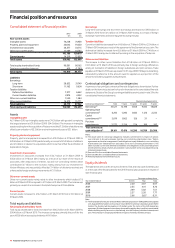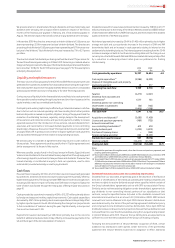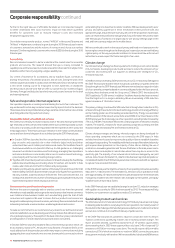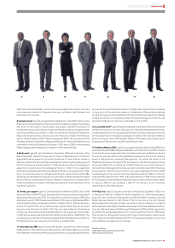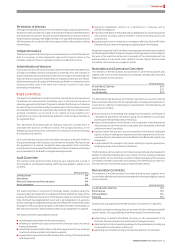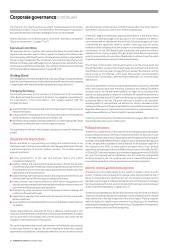Vodafone 2010 Annual Report Download - page 49
Download and view the complete annual report
Please find page 49 of the 2010 Vodafone annual report below. You can navigate through the pages in the report by either clicking on the pages listed below, or by using the keyword search tool below to find specific information within the annual report.
Performance
Vodafone Group Plc Annual Report 2010 47
platform which aims to meet the expected rise in demand for M2M services around
the world as more companies look to improve efficiency. This unit has set a target of
providing ten million carbon reducing M2M connections by 2013. This target has
been restated from the 2009 financial year as we were not able to accurately define
the global baseline.
We have established a new mobile health solutions business unit this year to accelerate
the development of healthcare solutions. Mobile technology offers significant
opportunities to improve the efficiency and effectiveness of health services. Much of
this can be achieved using existing technologies and we are working with healthcare
providers, governments and pharmaceutical companies to fully understand how we
can help.
We are also working to reduce the environmental impact of our products and services
and since November 2009 the Samsung Blue Earth phone has been introduced in
seven of our markets. The phone is designed to be environmentally friendly and has a
full touchscreen and other advanced multimedia features.
We continue to address the reuse and recycling of handsets, accessories and network
equipment and we have worked with suppliers to ensure substances prohibited by the
Restriction of Hazardous Substances Directive are phased out. We comply with the
EU’s Waste Electronic and Electrical Equipment Directive through handset recycling
programmes in all operating companies where it applies. During the 2010 financial
year 1.33 million phones were collected for reuse and recycling through collection
programmes in 15 local operating companies. 5,870 tonnes of network equipment
waste was generated in all operating companies (not including India) with 98% of this
sent for reuse or recycling.
Responsible business practices
Mobile phones, masts and health
We recognise that there is public concern about the safety of radio frequency (‘ RF’) fields
from mobile phones and base stations. For authoritative advice on potential health
effects from mobile phones and masts we look to independent reviews of the entire
body of evidence by panels of experts in the field, commissioned by recognised national
or international health agencies. We provide access to such expert reviews of the science
on our website (available at www.vodafone.com/responsibility/mpmh).
We understand that even with the current large body of scientific evidence, the World
Health Organization (‘WHO’) considers there are a few areas where uncertainty
remains and additional research is needed. In 2006 the WHO identified the following
three main areas for additional research: long-term (more than 10 years) exposure to
low-level RF fields, potential health effects of mobile device use in children and the
way the levels of RF fields absorbed are calculated. We continue to contribute to the
funding of independent scientific research in these areas via national and international
research programmes. In 2010 the WHO plans to review again what further research
may still be needed.
We require manufacturers of mobile devices to test for compliance with limits set by
the International Commissions on Non-Ionizing Radiation Protection (‘ICNIRP’) limits
for specific absorption rate (‘SAR’). Depending on the mobile device we require
testing to be performed for use both at the ear and against, or near, the body. We have
been actively engaged with the International Electrotechnical Commission (‘IEC’)
standards organisation to develop a new global protocol for testing phones for use
against, or near, the body. This new IEC standard, to be published in 2010, better
reflects the ways customers now use mobile devices.
Responsible network deployment
We recognise that network deployment can cause concern to communities, usually
regarding the visual impact of base stations or health issues concerning RF fields.
For many years we have implemented a responsible network deployment policy
covering these issues. In recognition that we are increasingly working with outsourced
partners in delivering the most efficient network we have commissioned an external
party to analyse the systems and controls we have in place to ensure our contractors
meet this policy.
We continue to engage closely with local communities as part of the planning
process for new masts. Our long-term programme of engagement with a range of
stakeholders demonstrates that we place importance on acting responsibly. In
surveys of external stakeholder opinion conducted annually over the last three
years, an average of 83% of respondents regarded Vodafone as acting responsibly
regarding mobile phones, masts and health.
We aim to comply with local planning regulations but are sometimes found to be in
breach. This is normally related to conflicting local, regional or national planning
regulations. During the 2010 financial year we were found to be in breach of planning
regulations relating to 370 of our total 104,344 mast sitings. Fines levied by regulatory
bodies or courts in relation to offences under environmental law or regulations were
approximately £89,000.
Supply chain
We continue to work to improve labour and environmental standards across our supply
chain. This year we reviewed and updated our Code of Ethical Purchasing and Supplier
Evaluation Scorecard. Both now include more stringent labour and environmental
requirements for suppliers. During the 2010 financial year we:
assessed 64 suppliers against our evaluation scorecard on social and
environmental aspects. The scorecard allows us to identify strengths and
weaknesses in our suppliers’ sustainability management and performance
programmes and highlight areas where improvement is needed. Over the last four
years we have evaluated over 638 suppliers; and
carried out 24 on-site evaluations of high risk suppliers. During these visits we
identified 139 areas for improvement, mainly concerning the inadequacy of
practices on health and safety and working hours.
Social investment
The Vodafone Foundation and its network of 27 local operating company and associate
foundations have continued to implement a global social investment programme.
During the 2010 financial year the Company made a charitable grant of £18.0 million to
the Vodafone Foundation. In addition, operating companies made charitable grants
totalling a further £17 million to their foundations and a further £4 million directly to
social causes. Total donations for the year ended 31 March 2010 were £41.7 million
and included donations of £2.7 million towards foundation operating costs.
The Vodafone Foundation made grants to charitable partners engaged in a range of
global projects. Its areas of focus are: utilising mobile technology for the benefit of
all, sport and music as a means of benefiting some of the most disadvantaged young
people and their communities, and disaster relief and preparedness.
The majority of the Vodafone Foundation funds are distributed in grants through
operating company foundations to a variety of local charitable organisations meeting
the needs of the communities in which they operate.
Key performance indicators(1)
2010(2) 2009(2) 2008(2)
Vodafone Group
Energy use (GWh) (direct and indirect) 3,278 3,044 2,920
Carbon dioxide emissions (millions of tonnes) 1.21 1.22 1.30
Percentage of energy sourced from renewables 23 19 18
Number of phones collected for reuse and recycling (millions) 1.33 1.53(3) 1.14(3)
Network equipment waste generated (tonnes) 5,870 4,944(3) 4,199
Percentage of network equipment waste sent for reuse or recycling 98 97 95
Notes:
(1) These performance indicators were calculated using actual or estimated data collected by our mobile operating companies. The data is sourced from invoices, purchasing requisitions, direct data
measurement and estimations where required. The carbon dioxide emissions figures are calculated using the kWh/CO2 conversion factor for the electricity provided by the national grid, suppliers or
the International Energy Agency and for other energy sources in each operating company. The data excludes India, Ghana, Qatar and Vodacom. Our joint venture in Italy is included in all years. Amounts
related to the 2008 financial year exclude Tele2 in Italy and Spain.
(2) Australia is excluded as it is no longer a subsidiary; the comparative data for 2009 and 2009 has also been restated.
(3) Amounts related to the 2009 and 2008 financial years have been amended. Refer to the online sustainability report for further information.





